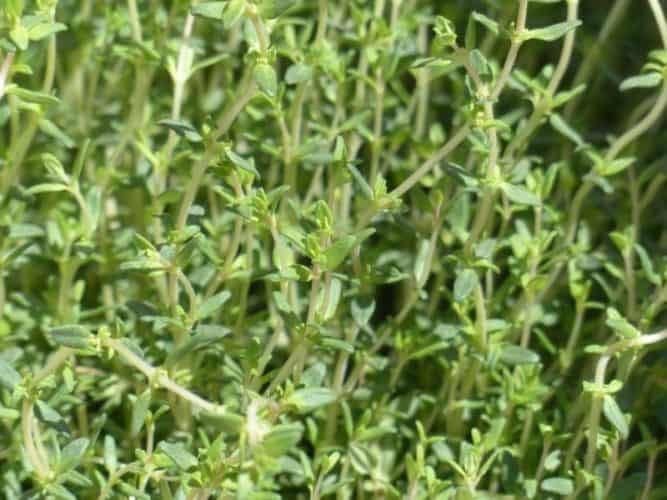Cooking would be bland without the addition of fresh herbs. Whether it’s basil in pasta sauce, rosemary on potatoes or parsley in salsa verde, fresh herbs are essential. But can you give yourself an endless supply of herbs?
Can You Freeze Fresh Herbs?
Yes, you can freeze fresh herbs for up to 6 months, generally. To freeze fresh herbs, the best approach is to pack them into an ice cube tray and cover them with water or oil. Once frozen, pop the herb cubes out and into a bag.
Do Do Fresh Herbs freeze well? Yes
Can you refreeze Fresh Herbs? Yes
How to Freeze Fresh Herbs
First of all, let’s look at the basic method we recommend for freezing fresh herbs. This will work for the leaves of the majority of herbs including basil, parsley, coriander, thyme and rosemary:
- Chop: Chop the herbs up. You don’t need to dice them up too finely but it’s a good idea to slice them up a little. This slicing will bruise the leaves and help to release some of the flavours.
- Portion into an Ice Cube Tray: Portion your chopped herbs out into the slots of an ice cube tray. Fill them up with herbs around 75% of the way.
- Seal: Top the slots of the ice cube tray up with olive oil or water. This will protect the herbs, seal them and also make them easier to store in the longer term.
- Freeze: Wrap the tray in a layer of cling film if you want to protect it further before placing it in the freezer.
- Bag Up: Once frozen solid, remove the tray from the freezer and pop the cubes out into a freezer bag.
- Final Freeze: Label the bag before returning it to the freezer.

This is the basic method for freezing herbs. We’ve covered some of the more popular herbs individually below:
How to Freeze Basil
Basil is one herb that can instantly add Italian flair to your dish. Stir it into a ragu, place a leaf on a piece of mozzarella or stir it into a tomato salad to give it a Mediterranean hit.
You can even use basil in desserts paired with strawberries. Delicious! But the question is, how do you freeze basil effectively?
Basil is a soft, delicate herb so we would suggest not freezing the leaves whole. This does mean you won’t be using your frozen basil for garnishing a dish or using it on salads as the texture will be off.
The best approach is the one above. Freezing it submerged in olive oil in cubes is the most efficient and effective way to freeze basil without losing any of the aromas.

How to Freeze Parsley
Parsley is a herb that you can freeze but, much like basil, is only good for freezing in ice cube trays to add an instant hit of parsley flavour to your cooking.
Don’t try to freeze parsley leaves whole which you can then use as a garnish as they will become a mushy mess.
However, if you want to add the refreshing flavour of parsley to a dish you’re going to cook then frozen works a treat and our ice cube method outlined above for freezing basil is the best approach to take.
How to Freeze Thyme
Unlike basil and parsley, with thyme, you can actually freeze it still intact as sprigs and leaves. You can use the ice cube method we have used above but if you want to save yourself all that effect then try the method we have used below for freezing thyme.
- Clean: First, clean the thyme sprigs. You want to make sure no dirt or bugs are hidden in the leaves. Try to clean it with a brush and a shake as you don’t want to add too much water to your thyme.
- Bag Up: Carefully place your thyme into a freezer bag and then seal it up, squeezing out as much of the air as possible.
- Freeze: Place in the freezer.
When you want to add the deep flavour of thyme to your next stew or ragu, just grab a sprig and toss it into your pot as you normally would – no need to defrost it thankfully!

How to Freeze Chives
Sometimes adding onion to a dish can be a little overpowering but you still want that hit of onion flavour in the background. That’s where chives come in.
You can cut them up with scissors straight into a dish to give it that subtle onion flavour without it being too harsh. But can you freeze chives?
Yes, you can! If you scroll to the top of this page where we have discussed freezing fresh herbs, you can use the exact same approach:
Cut the chives up, place them into an ice cube tray with olive oil or water, freeze and then pop the frozen cubes out to store for the longterm.
How to Freeze Coriander
You’re going to find this a little monotonous if you’ve read how to freeze parsley, basil and chives already because, as you’ve probably guessed, the best approach to take with coriander is to freeze it in ice cube trays.
But don’t let your creativity get stunted here.
You can actually try freezing your own Asian-inspired spice and herb mixes in an ice cube tray:
Take some fresh coriander, galangal, ginger, garlic, fresh chilli then grate or slice it up, give it a mix and then scoop it into an ice cube tray. Cover with olive oil or melted butter and freeze into cubes.
You now have little cubes that you can toss into a curry, soup or stir fry for an instant hit of flavour.

How to Freeze Mint
Mint is another fresh herb that will freeze well and yes, again, you will want to go down the route of using an ice cube tray.
Mint leaves are a little hardier however so in some cases you can freeze the leaves whole. Be warned, however, that if air gets to the leaves they can turn black which is not particularly appealing.
The advantage of freezing in water or oil is that the liquid acts as a barrier to the air and therefore protects against oxidation.
How to Freeze Rosemary
As rosemary is hardier than most herbs, you can actually freeze the sprigs whole as we have done with thyme. Just be wary that, when frozen, the leaves will be quite brittle and will fall off the sprig quite easily.
To avoid any unwanted damage, store the whole springs in a plastic container as opposed to a bag.
Again, you can also use the ice cube approach that can use when you freeze fresh herbs with rosemary.

5 Tips for Freezing Fresh Herbs
Now you know how to freeze it, we’ve got our 5 top tips which we strongly recommend following when freezing fresh herbs to have the best results:
Freeze in Cubes
This is the ultimate way to freeze fresh herbs. It means you can grab a cube of flavourful fresh herbs from the freezer and pop it directly into your cooking whether that’s a sauce, soup, stew or curry.
Don’t Defrost
There’s no need to defrost fresh herbs. If you have frozen it in cubes then pop a cube into your cooking. If you have frozen sprigs then these can also be popped straight into your cooking.
Mix Herbs
Don’t limit yourself so get creative. You can mix different herbs together in one cube to create powerful mixes. Why not try mixing sage, thyme and rosemary in one cube for a classic bouquet garni.

Freeze Sprigs of Woody Herbs
Woody, hardy herbs can be frozen whole. You can then toss the whole sprig into your cook or shake the leaves off the frozen twigs.
Avoid Using as Garnish
Unfortunately, fresh herbs will not look appealing once thawed so avoid using them as a garnish in your cooking.
How Long Can You Freeze Fresh Herbs?
6 months is the approximate time you can keep fresh herbs in the freezer.
They will remain frozen and will be perfectly safe to eat beyond this time frame, but there is a chance the flavour will degrade, so you won’t get that much-needed hit of flavour in your dishes.
Most soft herbs will last for around 1 week in the fridge. Hardier herbs, such as rosemary, will last for around 3 weeks. You can make herbs last longer by storing them with their ends in a pot of water.
How Do You Defrost Fresh Herbs?
Fortunately, if you have used our methods above then the simple answer is: You don’t need to!
That’s right, you can grab your herbs straight from the freezer and stir them straight into your dish as you cook it. This works particularly well for adding a hit of flavour to soups, stews, casseroles, sauces and curries.
You won’t want to use your frozen herbs on a ‘raw’ dish such as a Caprese salad and you won’t want to use your frozen herbs as a garnish.
Can You Refreeze Fresh Herbs?
We would avoid refreezing fresh herbs.
You’ll degrade the flavour and they will become increasingly mushy. This is why the ice cube method makes it so easy to use as much as you need at one time.
Do Fresh Herbs Freeze Well?
Sort of… By that, we mean that a lot of the soft, fresh herbs such as basil or parsley will freeze well in terms of flavour.
Unfortunately, their texture will be completely off. If you freeze any of the softer herbs and then thaw them out to garnish a dish or salad you’ll soon discover that the leaves become mushy.
So when you decide to freeze fresh herbs, only do so for their flavour and not for their looks.
Related FAQs
If you’ve still got questions about freezing fresh herbs or herbs in general, then these may help:
Yes, you can freeze pesto made with a variety of herbs whether it’s a traditional basil pesto or something more experimental. Simply portion the pesto into an ice cube tray, freeze and then pop the cubes into a freezer bag.
Yes, it’s possible to freeze any form of flavoured, compound butter. Roll the herb butter into a log between sheets of clingfilm then freeze. You can then use a serrated knife to slice a ring of butter off the end of the log when you need it.
Of course! Herbs can easily be frozen from the garden, just make sure you give them a thorough clean to remove dirt and bugs before freezing them.



Can you freeze dill
Of course! We have a full guide here: https://freezeit.net/can-you-freeze-dill/